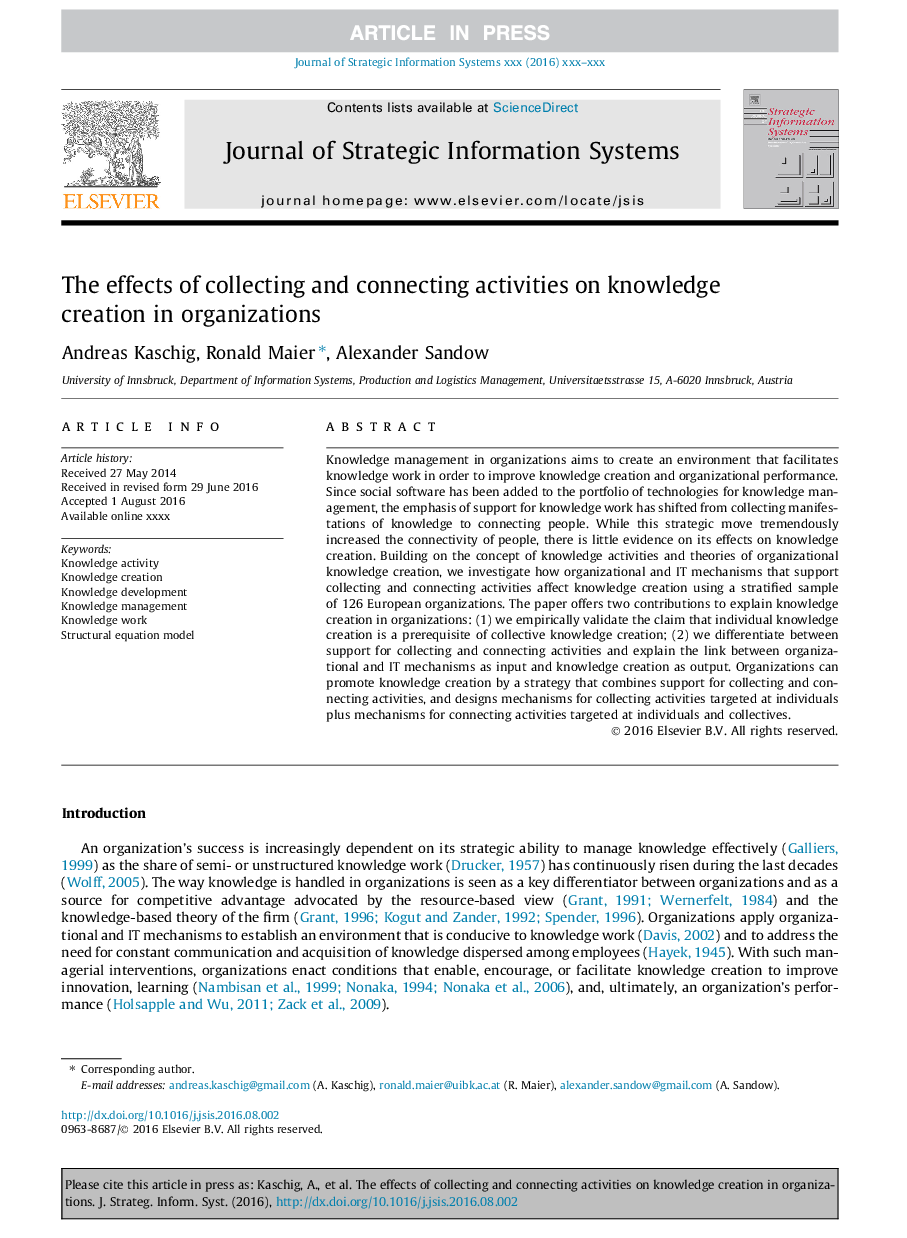| کد مقاله | کد نشریه | سال انتشار | مقاله انگلیسی | نسخه تمام متن |
|---|---|---|---|---|
| 4973098 | 1451429 | 2016 | 16 صفحه PDF | دانلود رایگان |
عنوان انگلیسی مقاله ISI
The effects of collecting and connecting activities on knowledge creation in organizations
ترجمه فارسی عنوان
اثرات جمع آوری و ارتباط فعالیت ها بر روی ایجاد دانش در سازمان ها
دانلود مقاله + سفارش ترجمه
دانلود مقاله ISI انگلیسی
رایگان برای ایرانیان
کلمات کلیدی
فعالیت دانش، ایجاد دانش، توسعه دانش، مدیریت دانش، کار دانش، مدل معادلات ساختاری،
ترجمه چکیده
مدیریت دانش در سازمان ها با هدف ایجاد محیطی است که کار دانش را تسهیل می کند تا به بهبود دانش و عملکرد سازمانی کمک کند. از آنجاییکه نرم افزار اجتماعی به مجموعه ای از فن آوری های مدیریت دانش اضافه شده است، تاکید بر حمایت از کار دانش از جمع آوری تظاهرات دانش برای اتصال افراد تغییر یافته است. در حالی که این حرکت استراتژیک ارتباطات مردم را به شدت افزایش داده است، شواهد کمی در مورد اثرات آن بر ایجاد دانش وجود دارد. بر پایه مفهوم فعالیت های دانش و تئوری های ایجاد دانش سازمانی، ما بررسی می کنیم که چگونه سازوکار سازمانی و فناوری اطلاعات که از فعالیت های جمع آوری و ارتباطی حمایت می کند، بر ایجاد دانش تاثیر می گذارد با استفاده از یک نمونه طبقه بندی شده از 126 سازمان اروپایی. این مقاله دو پیشنهاد را برای توضیح خلق دانش در سازمان ارائه می دهد: (1) ما تجربی ادعا می کنیم ادعا می کند که ایجاد دانش فردی، یک پیش شرط برای ایجاد دانش جمعی است؛ (2) ما بین حمایت از جمع آوری و ارتباط فعالیت ها و تشریح ارتباط بین مکانیسم های سازمانی و فناوری اطلاعات به عنوان ورودی و ایجاد دانش به عنوان خروجی تبریک می گوییم. سازمان ها می توانند دانش را با یک استراتژی که شامل پشتیبانی از جمع آوری و ارتباط فعالیت ها و ایجاد مکانیزم برای جمع آوری فعالیت های هدفمند در افراد و مکانیسم های ارتباط فعالیت هایی که افراد و گروه ها را هدف قرار می دهد، ترویج کند.
موضوعات مرتبط
مهندسی و علوم پایه
مهندسی کامپیوتر
سیستم های اطلاعاتی
چکیده انگلیسی
Knowledge management in organizations aims to create an environment that facilitates knowledge work in order to improve knowledge creation and organizational performance. Since social software has been added to the portfolio of technologies for knowledge management, the emphasis of support for knowledge work has shifted from collecting manifestations of knowledge to connecting people. While this strategic move tremendously increased the connectivity of people, there is little evidence on its effects on knowledge creation. Building on the concept of knowledge activities and theories of organizational knowledge creation, we investigate how organizational and IT mechanisms that support collecting and connecting activities affect knowledge creation using a stratified sample of 126 European organizations. The paper offers two contributions to explain knowledge creation in organizations: (1) we empirically validate the claim that individual knowledge creation is a prerequisite of collective knowledge creation; (2) we differentiate between support for collecting and connecting activities and explain the link between organizational and IT mechanisms as input and knowledge creation as output. Organizations can promote knowledge creation by a strategy that combines support for collecting and connecting activities, and designs mechanisms for collecting activities targeted at individuals plus mechanisms for connecting activities targeted at individuals and collectives.
ناشر
Database: Elsevier - ScienceDirect (ساینس دایرکت)
Journal: The Journal of Strategic Information Systems - Volume 25, Issue 4, December 2016, Pages 243-258
Journal: The Journal of Strategic Information Systems - Volume 25, Issue 4, December 2016, Pages 243-258
نویسندگان
Andreas Kaschig, Ronald Maier, Alexander Sandow,
